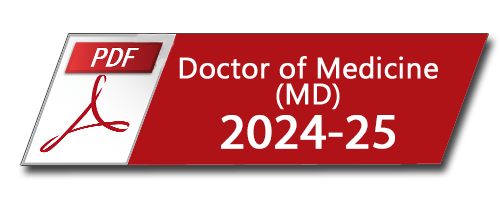General Education Course Description
Course Prerequisite: None
Course Summary: This course covers the basic skills of the English language required for students of Medicine.
This course includes the use of professional English in medicine including medical terminology with the correct
pronunciation. It hones the students’ English language skills to read, write, listen and speak effectively in medical
contexts.
Course Prerequisite: ENG 103
Course Summary: Health Sciences Communication in English covers the soft skills required for a medical
professional to interact with patients and their families. At every level, it emphasizes Empathy, Active Listening,
Critical Thinking, and problem-solving skills while interacting with patients, their families as well as their colleagues.
Students are exposed to techniques of communicating in different contexts. Public Speaking skills including
conference presentations are practiced
Course Prerequisite: None
Course Summary:The Computer Skills course is designed to provide students with basic Information Technology
(IT) to equip them with the essential skills required as healthcare professionals. This course covers system security,
communications, and a variety of computer applications including Word, Excel, and PowerPoint.
The students are exposed to input-output devices, which will be helpful in their future careers. The course also
includes discussions on the impact of information technology on various aspects of healthcare.
Course Prerequisite: None
Course Summary: Psychology is the study of human behavior and consists of various psychological principles
and theories that enhance one’s understanding of human thoughts, emotions, and behaviors. This course includes
psychological principles such as learning, behavior, emotions, and personality development that will aid in the
comprehensive management of patients required of medical professionals. It also includes the practical skills of
counseling and motivational interviewing that are integral components of good medical practice.
Course Prerequisite: None
Course Summary: This course adopts a variety of language situations to assimilate everyday life issues for
students of medical and health sciences. Different issues related to daily life such as greetings and introductions
are covered through oral dialogues. The course gives priority to pronunciation and correct articulation while
speaking in Arabic.
Course Prerequisite: None
Course Summary:Islamic Culture and Medicine course introduces the concept of medicine in Islamic belief. The
course covers the pillars of the Islamic faith, the ethical and moral issues, rights and duties, and allowance and
forbiddance of certain surgeries and procedures related to medicine under Islamic belief.
Course Prerequisite: None
Course Summary: Psychology is the study of human behavior and consists of various psychological principles
and theories that enhance one’s understanding of human thoughts, emotions, and behaviors. This course includes
psychological principles such as learning, behavior, emotions, and personality development that will aid in the
comprehensive management of patients required of medical professionals. It also includes the practical skills of
counseling and motivational interviewing that are integral components of good medical practice.
Course Prerequisite: None
Course Summary: This course adopts a variety of language situations to assimilate everyday life issues for
students of medical and health sciences. Different issues related to daily life such as greetings and introductions
are covered through oral dialogues. The course gives priority to pronunciation and correct articulation while
speaking in Arabic.
Course Prerequisite: None
Course Summary: Islamic Culture and Medicine course introduces the concept of medicine in Islamic belief. The
course covers the pillars of the Islamic faith, the ethical and moral issues, rights and duties, and allowance and
forbiddance of certain surgeries and procedures related to medicine under Islamic belief.
Course Prerequisite: None
Course Summary: The Emirates society course seeks to consolidate national belonging and identity and
appreciate the national achievements of the United Arab Emirates. The course focuses on introducing students to
the main social features of the Emirati community and its core values and heritage, as well as the history and
geography of the country. It discusses the internal and foreign policy, social development, and services provided
by the State, including the empowerment of women and their role in society. The course also aims to shed light on
UAE’s role in building an Emirati knowledgeable society, encouraging multiculturalism, and developing solid
economic and technological infrastructure, as well as positioning UAE in a globally competitive level. The course
also includes the future visions and challenges towards developing strategic plans as it discusses Federal
Government Vision and Abu Dhabi's Vision 2030 and the different issues related to future development plans and
the expected challenges.
 Contact Us
Contact Us
